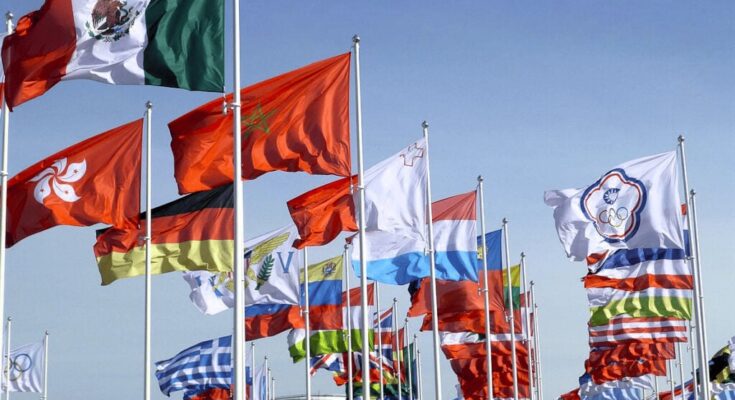Did you know that there are three very well-known flags of powerful countries in the world whose flags are completely banned from the Paris 2024 Olympics?
As thousands of athletes from around the globe wrap up their impressive presence in Paris for the 2024 Summer Olympics, three major nations were notably absent from parade of flags waving in the French stadia and streets. Which are these nations and why are they totally banned from the Olympics?
Due to ongoing tough issues around doping, geopolitical tensions and conflicts, these three countries have been completely banned from having their athletes compete under their very own national flags during this year’s Olympics.
Russia and Belarus are Europe’s banned nations from the Olympics
Two and a half years after the brutal invasion of Ukraine by Putin’s Russia and the unequivocal support that Belarus and its governing regime demonstrated for the conflict, the International Olympic Committee (IOC) took a rare and very tough stance against the two nations.
All Russian and Belarusian athletes have been barred from competing under their own nation’s flags in this year’s Summer Olympics. Obviously, a total ban on innocent athletes who have nothing to do with the Kremlin would be unfair. So these athletes are allowed to participate as individuals. However, they have to participate as “Individual Neutral Athletes” (AIN, from the French acronym for Athlètes Individuels Neutres).
This decision meant that hundreds of athletes from these two nations were not allowed to display any national symbols of Russia or Belarus during the Paris Olympics, including flags, anthems, or even uniforms that showed their country’s colours or emblems.
During the last Olympics of Tokyo 2020 (which were actually held one year later due to the COVID pandemic), the Russian athletes competed under the acronym ”ROC” as their nation had been banned again. That ban, however, had nothing to do with geopolitics. It was rather a punishment of Russia for allegedly promoting doping at a state-level to illegally boost the performance of their athletes.
The decision of the IOC to force Russian and Belarussian athletes to compete as neutrals was not easy. However, the IOC aimed to send a strong message against an illegal war.
Apparently, there have been calls for the IOC to similarly ban Israel, because of the ongoing humanitarian catastrophe in Gaza; however, this did not happen.

Taiwan, the other banned flag at the Olympics
Taiwan, the island-nation officially known as the Republic of China (ROC), has been a hot and debatable topic in international politics and therefore the Olympics for decades.
Taiwan was once part of China before the Communist revolution. However, it has been more than 70 years since the island of Taiwan has been separated from mainland China. As a result of this conflict, Taiwanese athletes have been banned from competing under the name ”Republic of China”. Instead, the term “Chinese Taipei” has been used since 1981. The nation is not allowed to use the official flag of Taiwan, which used to be China’s flag before the Communist revolution. Instead, Taiwanese athletes have been using a specially designed “Plum Blossom Banner” on a white background flag.
This arrangement had been a tough compromise between the strong desire of the Taiwanese people to participate in the Olympics and China’s strong persistence that Taiwan is a part of its territory and therefore has no right to compete in the Olympics whatsoever.
By using the “Chinese Taipei” compromise with the special flag, athletes from Taiwan can compete freely in the Olympics. However, they are not allowed to directly challenge China’s claims on their island.



